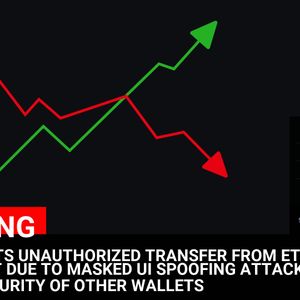In the ever-evolving world of cryptocurrency, regulatory clarity is paramount. For crypto businesses operating in Europe, a significant development is on the horizon. The European Securities and Markets Authority (ESMA), the EU’s financial watchdog, has just dropped a bombshell – proposed guidelines aimed at ensuring the crypto firm competence of staff within crypto asset service providers. This move, aligning with the landmark Markets in Crypto-Assets (MiCA) Regulation, signals a new era of accountability and professionalism in the crypto space. Let’s dive into what these guidelines entail and what they mean for the future of crypto businesses and professionals. Why is Crypto Firm Competence Suddenly a Hot Topic? The explosive growth of the cryptocurrency market has brought immense opportunities, but also significant risks. From market volatility to complex technological underpinnings, and the ever-present threat of financial crime, the crypto landscape demands a high level of expertise. Regulators worldwide are increasingly concerned about investor protection and market integrity. The EU, through MiCA, is taking a proactive stance, and ESMA’s proposed guidelines on crypto firm competence are a crucial step in operationalizing this regulation. But why now? Consider these factors: Investor Protection Imperative: As more retail investors enter the crypto market, ensuring they are dealing with knowledgeable and ethical professionals becomes vital. Incompetent staff can lead to mis-selling, poor advice, and ultimately, financial losses for investors. Market Stability Concerns: Lack of expertise within crypto firms can contribute to market instability. Understanding market operations, pricing mechanisms, and risk management is essential for maintaining a stable and efficient crypto ecosystem. Combating Financial Crime: The crypto space, unfortunately, has been targeted by illicit activities. Staff with a deep understanding of regulatory frameworks, Anti-Money Laundering (AML) and Counter-Terrorist Financing (CTF) obligations are crucial in preventing and detecting financial crime. Technological Complexity: Blockchain technology and cryptocurrencies are inherently complex. Staff need to grasp these intricacies to provide informed services and navigate the technical challenges of the industry. Global Regulatory Pressure: International bodies and national regulators are increasingly focusing on crypto regulation. The EU’s move is part of a global trend towards establishing clear standards and frameworks for the crypto industry. Decoding the ESMA Guidelines: What Skills are in Demand? ESMA’s proposed guidelines are not just about ticking boxes; they aim to foster genuine expertise within crypto firms. The regulator has outlined specific areas of knowledge and skills that staff should possess. Let’s break down the key components of crypto firm competence as defined by ESMA: Area of Competence Description Why it Matters Crypto Risks Understanding Knowledge of the inherent risks associated with crypto assets, including market volatility, technological vulnerabilities, cybersecurity threats, and regulatory risks. Essential for risk management, investor education, and responsible service provision. Market Operations Expertise Understanding how crypto markets function, including trading mechanisms, order book dynamics, market participants, and liquidity considerations. Crucial for fair pricing, efficient trading, and preventing market manipulation. Pricing and Valuation Knowledge Ability to analyze crypto asset pricing, understand valuation methodologies, and identify factors influencing price movements. Important for providing investment advice, managing portfolios, and ensuring fair pricing practices. Blockchain Technology Proficiency Solid grasp of blockchain technology, its underlying principles, different types of blockchains, and their applications in crypto assets. Necessary for understanding the technical aspects of crypto assets, assessing project viability, and navigating technological developments. Regulatory Frameworks Mastery Comprehensive knowledge of relevant regulations, including MiCA, AML/CTF directives, data protection laws, and consumer protection regulations. Fundamental for compliance, legal operations, and ensuring ethical business practices. Tax Implications Awareness Understanding the tax implications of crypto assets, including income tax, capital gains tax, VAT, and reporting obligations in relevant jurisdictions. Vital for providing accurate tax information to clients and ensuring tax compliance for the firm. These competency areas are not just theoretical. They translate into practical skills needed for various roles within crypto firms, from customer service representatives to compliance officers and portfolio managers. ESMA’s guidelines emphasize that the level of competence required should be proportionate to the role and responsibilities of the staff member. What are the Implications of These ESMA Guidelines? The proposed guidelines on ESMA guidelines for staff competence are poised to have a far-reaching impact on the crypto industry in Europe. Here are some key implications: Elevated Industry Standards: These guidelines will likely drive up the professional standards within the crypto industry. Firms will need to invest in training and development to ensure their staff meets the required competency levels. Increased Compliance Burden: Crypto asset service providers will face a greater compliance burden as they implement processes to assess and maintain staff competence. This could involve developing internal training programs, conducting competency assessments, and maintaining records of staff qualifications. Competitive Advantage for Compliant Firms: Firms that proactively embrace these guidelines and prioritize staff competence may gain a competitive advantage. Investors and partners are likely to favor firms that demonstrate a commitment to professionalism and regulatory compliance. Enhanced Investor Trust: By ensuring staff competence, these guidelines aim to build greater investor trust in the crypto market. Knowing that professionals within crypto firms are knowledgeable and qualified can boost investor confidence and encourage wider adoption. Potential for Industry Consolidation: The increased compliance burden and the need for investment in training could lead to some consolidation within the crypto industry. Smaller firms may find it challenging to meet the new requirements, potentially leading to mergers or acquisitions by larger, better-resourced players. Navigating the Future of Crypto Regulation and Competence The release of these proposed crypto regulation guidelines marks a significant step towards a more mature and regulated crypto market in Europe. While the guidelines are still in the consultation phase – with feedback being gathered until April 22nd and final guidelines expected in the third quarter – crypto firms should start preparing now. Here are some actionable insights: Assess Current Staff Competence: Firms should conduct a thorough assessment of the current competence levels of their staff across the areas outlined by ESMA. Identify any gaps in knowledge and skills. Develop Training Programs: Based on the competency assessment, develop targeted training programs to address identified gaps. These programs should cover the key areas of knowledge and skills highlighted in the ESMA guidelines. Implement Competency Assessment Processes: Establish ongoing processes for assessing and maintaining staff competence. This could involve regular training, knowledge tests, performance reviews, and professional development requirements. Stay Informed and Engage with Regulators: Keep abreast of regulatory developments, including the final ESMA guidelines and any updates to MiCA. Engage with industry associations and regulators to stay informed and contribute to the evolving regulatory landscape. Prioritize a Culture of Compliance and Professionalism: Foster a company culture that prioritizes compliance, ethical conduct, and continuous professional development. This is not just about meeting regulatory requirements; it’s about building a sustainable and reputable crypto business. Conclusion: A New Era of Professionalism in Crypto ESMA’s proposed guidelines on MiCA regulation and staff competence are a clear signal: the era of the Wild West in crypto is coming to an end in Europe. These guidelines are not just about regulation; they are about fostering a more professional, trustworthy, and sustainable crypto ecosystem. By prioritizing staff competence, the EU is taking a proactive approach to investor protection, market integrity, and responsible innovation. For crypto businesses, embracing these changes is not just about compliance – it’s about building a foundation for long-term success in a rapidly evolving industry. The future of crypto is professional, and competence is the key. To learn more about the latest crypto regulation trends, explore our article on key developments shaping crypto compliance.



















